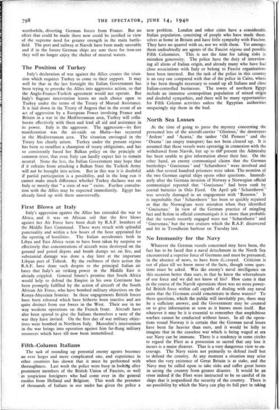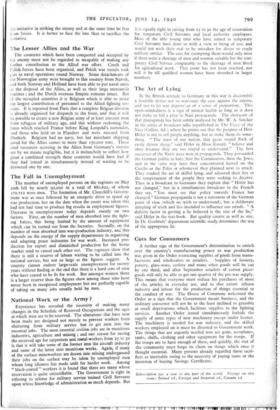No Immunity for the Navy
Whatever the German vessels concerned may have been, the fact has to be faced that a naval detachment in the North Sea encountered a superior force of Germans and must be presumed, in the absence of news, to have been dc.;troyed. Criticism is out of place till we know more of the facts, though some ques- tions must be asked. Was the enemy's naval intelligence on this occasion better than ours, in that he knew the whereabouts of our force and we did not know of his? How came it that in the course of the Narvik operations there was no more power- ful British force within call capable of dealing with any naval units that the Germans could concentrate in those waters? To these questions, which the public will inevitably put, there may be a sufficient answer, and the Government may be counted on to give information as soon as it knows more itself. But whatever it may be it is essential to remember that amphibious warfare cannot be conducted without losses. In all the opera- tions round Norway it is certain that the German naval losses have been far heavier than ours, and it would be folly to imagine that in the ceaseless war which is being waged at sea our Navy can be immune. There is a tendency in some circles to regard the Fleet as a possession so sacred that any loss it incurs is a major disaster. That is a very dangerous view to en- courage. The Navy exists not primarily to defend itself but to defend the country. At any moment a situation may arise when the very existence of Great Britain is at stake, and the Navy may be called upon to take risks and suffer great losses in saving the country from greater disaster. It would be an error indeed if the Fleet were instructed to be so careful of its ships that it jeopardised the security of the country. There is no possibility by which the Navy can play its full part in taking the initiative in striking the enemy and at the same time be free from losses. It is better to face the loss than to sacrifice the initiative.































 Previous page
Previous page